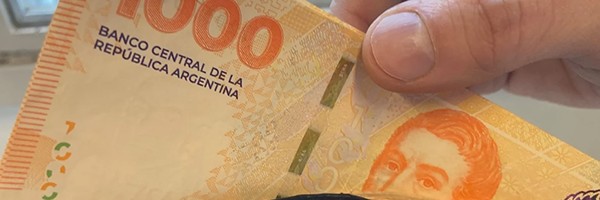Inflation in Blockaded Venezuela 10 Times Less Than in Milei’s Neoliberal Argentina
 Orinoco Tribune, March 9, 2024 —
Orinoco Tribune, March 9, 2024 —
This week, the Central Bank of Venezuela (BCV) released its report on Venezuelan inflation in February. The report showed improvement in the performance of this economic index, now standing at 1.2%, the lowest inflation has been in Venezuela since August 2012. Meanwhile, the expected inflation in Argentina, a country not subjected to blockades or illegal sanctions like Venezuela, for February stands at 15%. The Buenos Aires Price Index, one of the most important references, already reported 14.1% inflation with an annual total of 264.5%, as reported by Bloomberg.
The BCV stated that accumulated inflation in the first two months of 2024 reached 2.9%. From February 2023 until February 2024, annual inflation stood at 75.9%. In January, inflation was 107.4%, a figure not seen in almost a decade in Venezuela.
On Wednesday, March 6, the Venezuelan Observatory of Finance (OVF), an independent NGO linked to the far-right Venezuelan opposition, reported that the country closed February with a deflation of 0.5%. This figure means that prices fell half a percentage point compared to January. According to the report, this has not happened in 17 years.
The BCV and the OVF figures indicate a correction in the OVF figures overvalued in its January report—if compared to the BCV figures—as an explanation for the “deflation” reported by the NGO. Despite the reality of these figures, many far-right economists began to make predictions about the deflation phenomenon, which is also damaging to an economy.
According to the OVF, among the factors that explain the deceleration of inflation is “the nominal appreciation of the exchange rate of 1.2%.” The price of the dollar went from Bs 38.42 to Bs 37.96 due to the greater sales of foreign currency by the BCV and the lower issuance of money by the Central Bank. However, recent figures released by the banking system indicate that the BCV’s participation in the foreign currency market decreased in comparison to January 2024 and February 2023. This indicates that the foreign exchange market might be reaching an equilibrium.
Disaggregated inflation
Within the price index in February, the items with the lowest variation were housing services, excluding telephone services, at 0.2%, educational services at 0.8%, and food and non-alcoholic beverages at 0.9%.
The sectors with the highest inflation of the month are miscellaneous goods and services at 2.1%, leisure and culture at 2%, home equipment at 1.7%, and rental of homes at 1.4%.
The transportation, communications, and restaurants and hotels sectors closed February at 1.3% each. Following were health at 1% and alcoholic beverages and tobacco at 1.1%.
Presidential elections
This week, Venezuela’s National Electoral Council (CNE) announced that the presidential elections will be held on July 28. Economists and financial analysts, most of them linked to far-right political parties, have begun a campaign in an attempt to present the slow but steady recovery of Venezuela’s economy as an electoral strategy of Maduro’s administration. Spreading rumors about a deceleration of retail activity is part of the media warfare.
Venezuela has witnessed an explosion of new retail options at all levels, the return of car dealerships that almost disappeared after 2016, and more coherent economic policies by the Maduro administration since August 2018. These developments contradict the pessimistic presages and attempts to link economic improvement to the upcoming presidential elections.
